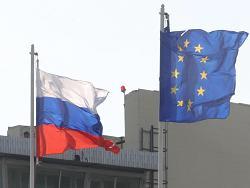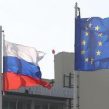
RUSSIA EXPLOITS EU’S VULNERABILTIES AT EU-RUSSIA SUMMIT
Publication: Eurasia Daily Monitor Volume: 5 Issue: 125
By:

The European Union played its cards ineptly at the EU-Russia summit in Khanty-Mansiisk on June 26 and 27. Moscow managed to define the atmosphere and rules of the game at this summit, taking advantage of the EU’s multiplying vulnerabilities. That those vulnerabilities are mostly self-inflicted does not seem to occur to key EU policy makers, who chase solutions dependent on Russian cooperation, instead of developing the EU’s own policies in response to its predicaments.
The external context to this summit was the worst for the EU and, commensurately, the most favorable for Russia’s zero-sum game, in the 11-year history of formal partnership between the EU and Russia. The continuing political and psychological shifts will translate into actual power shifts in the immediate future, unless the EU seriously addresses its mounting problems.
The EU came to this summit in the immediate wake of the Lisbon Treaty’s collapse in the Irish referendum, a repeat case of constitutional failure, due to EU authorities’ shortage of credibility in Western Europe. Crisis phenomena in Europe’s financial and credit systems, coupled with Russia’s galloping enrichment, partly at European expense, shifted the balance in Russia’s favor at this summit. The sudden realization that the gamble on bio-fuels was failing (triggering unprecedented food-price rises and inflation, unforeseen by EU planners) deepened the disarray among EU policy makers. Their one declared priority, Nabucco, was succumbing to indifferent leadership on both sides of the Atlantic.
Moscow chose the summit’s venue in Khanty-Mansiisk to showcase Russia’s oil and gas wealth and, implicitly, the EU’s dependence on Russian energy. This administrative unit, situated in Asia, is Russia’s number one oil and gas province. Politically, the Kremlin underscored its concept of Russia-EU interdependence in a vast Euro-Asian construction, intended to decouple Europe strategically from the United States and render NATO irrelevant. President Dmitry Medvedev announced at this summit that Russia would move the venue of the next summit with the EU even farther from Europe and into Asia, possibly to Vladivostok (Interfax, RIA-Novosti, June 27).
In Khanty-Mansiisk, Russian leaders almost openly gloated over Europe’s growing dependence on Russian energy. EU leaders inadvertently added to Russian leverage at this summit by seeking Russian cooperation for solutions in Iran, Afghanistan, Iraq, and the Arab-Israeli conflict, and now even the global food-security challenge (AFP, June 27). EU rhetoric, echoing that of Washington and NATO, postulates that the West needs Russian support for resolving those problems and presumes a Russian interest in win-win solutions. Moscow, however, is content to exploit those Western predicaments (which it did not create) and feels emboldened to do so each time it hears from the EU that the solutions require Russian support.
Even as the summit proceeded, the Russian state was coercing BP into ceding billions of dollars worth of assets to Russian companies. Last year, the Kremlin had similarly coerced Shell. The EU failed again at this summit to take issue with Russia over the shakedown of Europe’s two largest energy companies (Interfax, June 26-28). Within the same administrative unit as Khanty-Mansiisk lies Yugansk, the core production unit of the Yukos company, which was seized and handed over by the Kremlin to the Rosneft state company, using European banking credits. EU leaders in Khanty-Mansiisk chose to ignore these uncomfortable reminders of Russia’s behavior as an energy partner. They talked instead about mutual dependence, even as Europe slides into unilateral dependence, by default in Brussels and by strategic choice in Berlin.
Medvedev confirmed in Khanty-Mansiisk a policy on gas exports that he had first announced on June 5 in Berlin (see EDM, June 9) and the significance of which has yet to be appreciated in Europe. He said that Russia would at this stage pursue the Nord Stream and South Stream pipeline projects in parallel steps, as projects of equal importance (RIA-Novosti, June 27). This announcement officially introduces the policy of playing off various European gas-importing countries against each other. With its gas production stagnant, and gas deficits looming in the years immediately ahead, Russia will not be able to fill the existing export pipelines and the planned ones, such as Nord Stream and South Stream, anywhere near the declared capacity. It is therefore serving notice that northern and southern customers will have to scramble into deals with Russia for limited amounts of gas.
On the summit’s sidelines, Gazprom president Alexei Miller warned that EU energy-importing countries would have to compete increasingly with Russia’s internal market for gas. Noting the failure of the EU’s bio-fuels development policy (which reduces food crop cultivation), Miller told Europe that it had few alternatives to hydrocarbons and “no realistic alternative that would replace Russia” on hydrocarbons. According to him, Gazprom plans to build a network of service stations in EU countries for liquefied petroleum gas, as partial replacement for gasoline and diesel fuel (Izvestia, June 26; Interfax, June 27).
Russian Minister of Foreign Affairs Sergei Lavrov also played on the EU’s bio-fuels versus food crops dilemma, which led the EU to ask Russia at this summit to increase its food agricultural exports. “They put it frankly: they place significant hopes in Russia for a solution to the food security problem and the prospect of a further increase of food production in our country,” Lavrov summed up after the summit (Interfax, RIA-Novosti, June 27, 28).
Apparently, Russian leaders feel reinforced after this summit in their view that the EU needs Russia more than Russia needs the EU.




